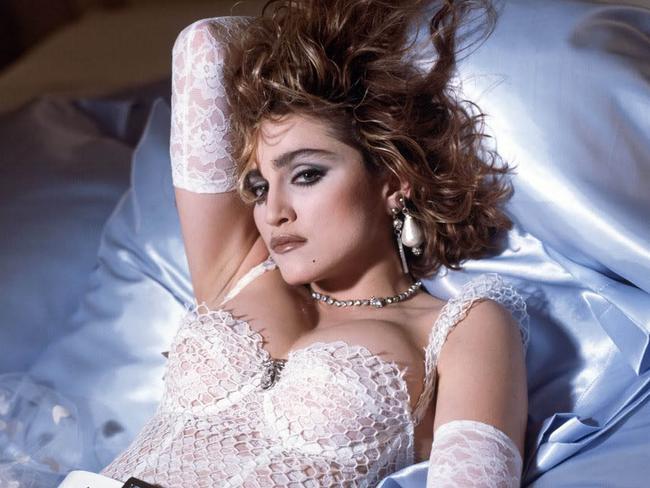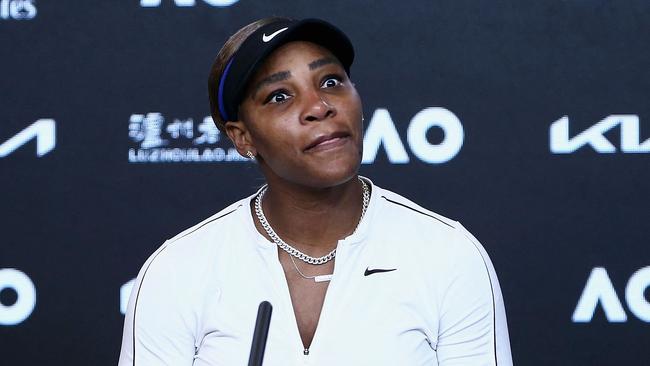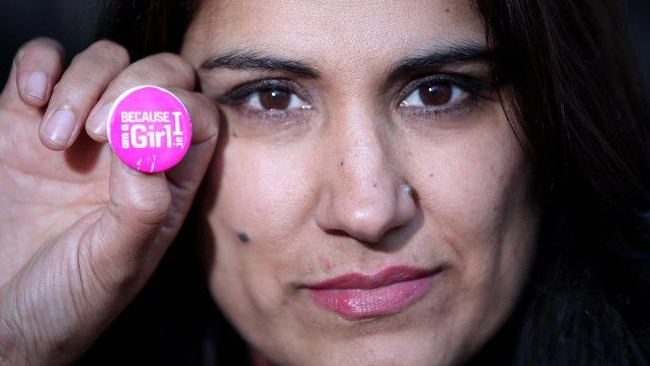
She was no Germaine Greer, to be sure. But for many girls who came of age in the early to mid-80s, Greer was too damn doctrinaire, telling women to live communally, discard the family unit, our sexy outfits and our heels. She equated make-up with oppression, but the hippie was happy for us to use a smidge of kohl eyeliner. As she grew older, Greer seemed to grow even more bitter about men.
So, we lapped up the positive energy of Madonna. Her sass, her lyrics, her raw sex appeal were signs of our liberation. We knew we couldn’t have it all, but who could? Not any man I knew. Or woman. We were determined to get as much from life as possible, and it was far more fulfilling and fun than Greer’s commune.
Listening to Madonna now, millions of women might have an overpowering urge to race to the bathroom and barf. The queen of reinvention has overplayed her hand badly.
Last weekend, Madonna put out this statement on Twitter: “The Patriarchy continues to try to crush my neck with their heavy boots, cut off my life force and take away my voice — Even those who call themselves artists…..You know who you are!!! DEATH TO THE PATRIARCHY! Now and Forever.”
Madonna is no Greer, not nearly as witty or clever. Wacky communes aside, Greer challenged the status quo whereas Madonna has tweeted utter tosh to team up with the fashionable and faux oppression brigade.
Who knows, maybe Madonna had a bad day at the studio. But the idea that “The Patriarchy” is destroying the 62-year-old Queen of Pop’s life is farcical. Forbes valued her wealth last year at $US550m. Others put it at $US855m. She’s the most successful solo artist in the history of the Billboard Hot 100 and the highest-grossing solo touring artist of all time. If that’s the patriarchy at work, can I have some too?
Maybe Madonna was pulling our leg. More likely, she has jumped aboard the express train of oppression that welcomes anyone, no matter how successful and free from patriarchal pressures their life has been.
By making it a numbers game, regardless of merit, the oppression agenda loses legitimacy.

Like Madonna, Serena Williams is a superstar. Millions of women admire her skill, her determination, her brassy success. A mother and a tennis champion, she became even more of a role model for young women. Until she lost the US Open in September 2018 and accused an umpire of being a “liar” and a “thief”. She sobbed at her post-match press conference that “I’m here fighting for women’s rights and women’s equality”. Nonsense. Things didn’t go Serena’s way on court that day and she chose the weapon du jour — the oppression agenda — to claim a headline and faux victimhood status.
Julia Gillard could have been a terrific political role model for women as Australia’s first female prime minister. Refreshingly, she said she wouldn’t use her gender for political purposes. Until her leadership went to custard. Then she delivered an attention-seeking speech accusing Tony Abbott of being a misogynist. Except her woes had nothing to do with the patriarchy. Her trouble was a political rival named Kevin Rudd who was stalking her job.
The same oppression gig was given an encore by former foreign minister Julie Bishop when, to her horror but not the surprise of many others, she didn’t land the Liberal leadership in 2018.
Hours before I came across Madonna’s phoney claim about being oppressed by the patriarchy, I was on my usual morning run, listening to a random podcast from the archives of the BBC’s stellar Desert Islands Discs series. Journalist Kirsty Young was interviewing Jasvinder Sanghera, a British-born woman who ran away from her Sikh family in Derby in the north of England when she was 16.

When she was 14 years old, Sanghera’s mum showed her a photo of the stranger she had been promised to in marriage at age 8. When Sanghera continued to object to the forced marriage, her parents locked her in her bedroom. After desperation, loneliness and a suicide attempt, she pretended to agree to the marriage. Released from her room, Sanghera fled the family home. Police found her and told her to phone her parents. When she rang them from a payphone, her mother gave her an ultimatum: “Come home and marry who we say, or from this day forward you are dead in our eyes.”
Excommunicated from her family, Sanghera made a life for herself and her children. She earned a first-class degree from university. In the same year Madonna performed Bad Girl on Saturday Night Live, Sanghera set up a foundation called Karma Nirvana to support victims of honour-based abuse and forced marriage. The catalyst was not just her own life, but the death of her sister, Rabina, who committed suicide by setting herself on fire.
Sanghera had every right to rail against the “patriarchy” and scream about “oppression”. Instead, in a quiet, determined voice, she spoke about the shame that girls are made to feel if they do not agree to cruel cultural practices that subjugate them.
One day in the future, young women will look back at this past decade with fresh eyes and wonder what got into spoilt, attention-seeking women such as Madonna. It’s bad enough that they go from being a role model to a model whinger. When women of influence pretend to be oppressed, it sends a dreadful message to young women to use oppression as a cloak for their own failings or when things don’t go to plan. Worst of all, attempts by these women to wear victim status as one might wear a fashion accessory is a serious disservice to women who are oppressed and deserve our full attention.



A few decades ago, when millions of young women like me listened to Madonna, we had an irresistible urge to get up and dance. More than dance, we wagged a finger and cast a wicked smile toward men nearby while singing the lyrics to Like a Virgin, Material Girl, Express Yourself and Justify My Love. Madonna wasn’t just a pop star. She was a feminist icon, of sorts.